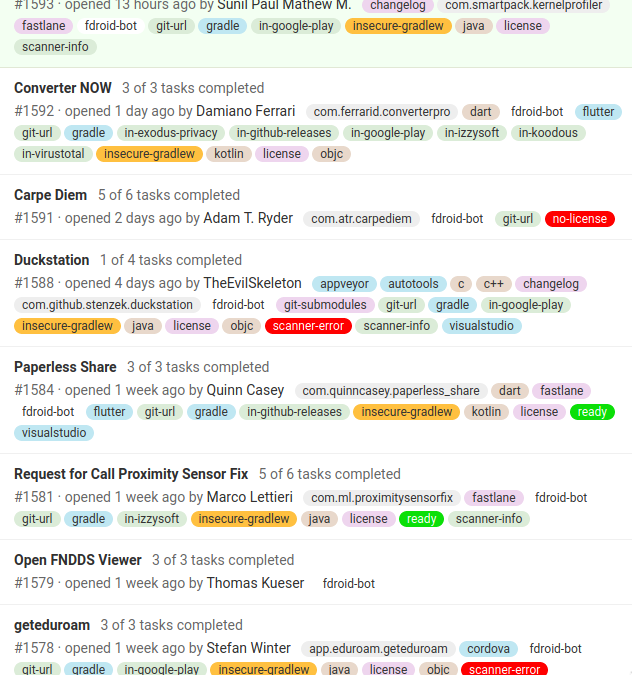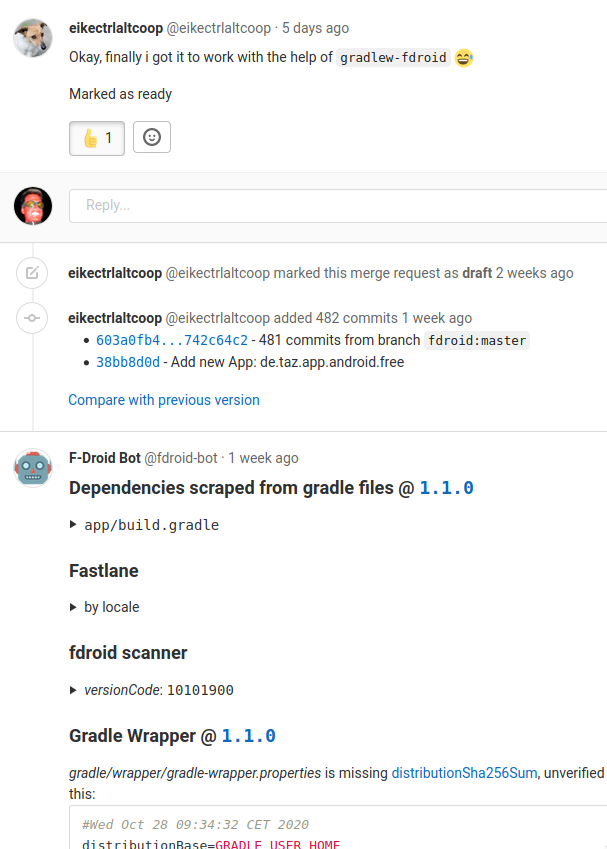Announcing issuebot
Posted on 2020-12-21 byF-Droid is a robot with a passion for Free and Open Source Software (FOSS), and now F-Droid has a new helper: issuebot! It started life as a hacked together script running on the RFP tracker, where it was doing some automated checks on the information that people submitted in their requests for packaging. As part of the Tracking the Tracker project, we talked to maintainers and contributors to F-Droid’s fdroiddata and RFP to find out how issuebot could help them. One key goal was to make it possible for people to contribute to the app reviews, even if they are not an Android developer in any way, shape, or form. This is possible by making issuebot run as many of the core build processes and review tools automatically, then issuebot presents that information as a response in the thread of the RFP issue or fdroiddata merge request. We brainstormed a number of ways to present this information, and decided the best place to integrate issuebot was into the existing workflow where F-Droid contributors and community members work on reviewing apps: the GitLab projects. There are always uses for this information that we did not anticipate, and the data was already being assembled into a single place, so issuebot also includes a JSON API.
Now issuebot is a full-fledged automaton that start with a source URL, build an APK app file, scan the source code and APK for issues, and post reports to gitlab.com. This has already improved the human efficiency in terms of reviewing app submissions and providing feedback to submitters.
RFP Issues
Anyone can submit a “request for packaging” (RFP) or app merge request to F-Droid. The basic user experience is familiar to most internet users since it is built around a user account and a form to submit text. This means that the RFP issue tracker has less technical users. Given the relative simplicity of issuebot, the goal had to be to help reviewers communicate to submitters. Technical submitters will be able to follow the issuebot posts, and in other cases, F-Droid contributors can point non-technical submitters to information in the issuebot reports in order to highlight problems. As long as they provide a link to a source code repository or an Android APK app file, issuebot can provide useful reviews on its own. It also presents lots of information to make the human reviewer’s job a lot easier. There are RFP issues, and the submitted apps can contain a wide variety of technological approaches and coding environments. No reviewer has all of those skills, so it is important for reviewers to be able to quickly find submissions that they will feel qualified to review. Also, there are many things that issuebot can automaticaly detect. Therefore, we built a system of colored labels for issuebot to add to every submission. From these labels, a reviewer can quickly select the platform they are familiar with, e.g. Flutter. They can also see whether a submission has clear problems that likely disqualify it, like requiring proprietary libraries or known tracking services.

The GitLab issue labels also provide a simple interface for managing when
issuebot runs on an issue.
issuebot runs on a schedule to scan
all new submissions and post its reports directly to the issue or merge
request. Once issuebot completes posting its report, it will add the
fdroid-bot label to the issue. That tells issuebot to ignore the issue
in future runs. To allow issuebot to run on any item again, remove the
fdroid-bot label. On the next run, issuebot will do the whole review
from the beginning.
fdroiddata Merge Requests
For app merge requests, we focused on the people involved in submitting, reviewing and accepting the merge requests. We therefore assume basic working knowledge of GitLab, Git, and how Android apps are built. In this case, issuebot responds to changes to the code contained in the merge request. Often times, when apps are submitted to fdroiddata, they must be changed in order to build properly and meet the F-Droid standards. In this case, the technical posts by issuebot speak directly to the app submitter. The F-Droid contributors regularly review the merge requests, and can provide feedback and assistance as expected by participants of a merge request user experience.
This merge request that adds the newspaper taz’s new app is a good example of the user experience. It was submitted as “Work In Progress” before issuebot started reviewing merge requests. It received review and feedback from F-Droid contributors. The submitter made changes, then issuebot kicked in and provided feedback to the submitter with each update.

Unfortunately, there are currently no labels on merge requests. Technical limitations of the GitLab API mean that adding labels like with the RFP issue tracker is not easy to implement. Adding labels to merge requests requires “Developer” privileges, which would also allow the issuebot account to modify code. To keep issuebot’s attack surface maintainable, it does not post labels for now.
JSON API
issuebot also provides a JSON API on top of the current HTML reports, so that any web app can use the data in their own user experience. This can be combined with our other developing APIs, like the buildserver status API. There are two entry points:
- Source code URL: RFP / fdroiddata
- Application ID: RFP / fdroiddata
Here is an excerpt of the Application ID entry point that shows the issuebot runs for one specific app. There are two runs, with the most recent first. The newer version has the results from more modules that were added since the first run.
"at.roteskreuz.stopcorona": [
{
"issueId": 1319,
"jobId": "925261691",
"modules": [
"925261691/1319/active-hostnames.py.json",
"925261691/1319/check-for-translation-service.py.json",
"925261691/1319/dependencies-scrape.py.json",
"925261691/1319/fastlane.py.json",
"925261691/1319/fdroid-scan-apk.py.json",
"925261691/1319/fdroid-scanner.py.json",
"925261691/1319/gradle-productFlavors.py.json",
"925261691/1319/gradle-wrapper.py.json",
"925261691/1319/links-to-services.py.json",
"925261691/1319/sdk.py.json",
"925261691/1319/suspicious-names.py.json",
],
"successfulBuilds": []
},
{
"issueId": 1319,
"jobId": "600681223",
"modules": [
"600681223/1319/check-for-translation-service.py.json",
"600681223/1319/dependencies-scrape.py.json",
"600681223/1319/fastlane.py.json",
"600681223/1319/fdroid-scan-apk.py.json",
"600681223/1319/fdroid-scanner.py.json",
"600681223/1319/gradle-productFlavors.py.json",
"600681223/1319/gradle-wrapper.py.json"
"600681223/1319/sdk.py.json",
"600681223/1319/suspicious-names.py.json",
]
}
],
The ultimate entry is a catalog of what issuebot saw in one particular app in one particular run, identified by the GitLab CI Job ID. That includes a list of relative paths to the JSON output of the issuebot modules that ran. The easiest way to get started with the API right now is to download the whole collection of files from the GitLab CI Job: go to the RFP Pipelines and click the most recent download link on the right-most column.
Future Work
The next step is linking together more key pieces of information in order to provide reliable and concrete tracking of the tracker SDKs and hostnames. The Exodus Privacy database now provides code signatures, network signatures and API Key IDs. The issuebot modules scrape domain names, library dependencies, and metadata from the AndroidManifest.xml that contains things like API Key IDs. There are many exciting possibilities that should be quite easy to implement now that this foundation is in place.
One of the ideas that we sketched out that still seems compelling is a dedicated web app for submitting app requests and getting information about reviews, anti-features, builds, privacy leaks, etc. This has the potential of greatly reducing the amount of technical knowledge required for people to be more involved in the process of getting the apps they use through the F-Droid submission and review process. What is clear is that this would be a relatively large scale project on its own, so we set it aside and kept it in mind while building issuebot.
(This work was supported by NLnet’s NGI Zero PET fund.)
